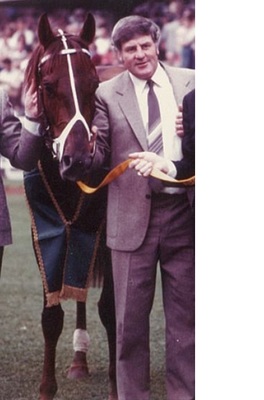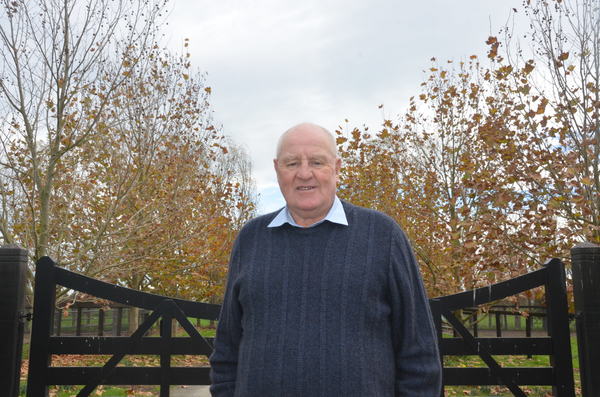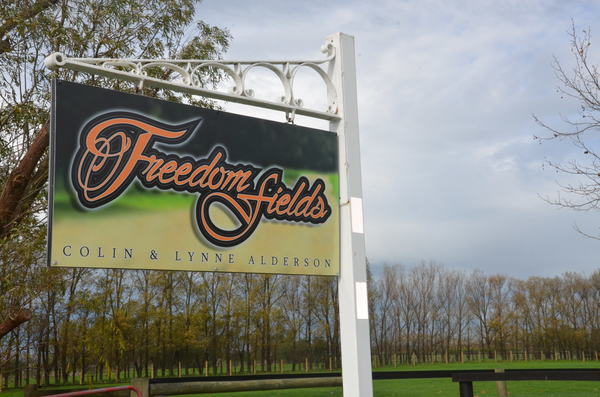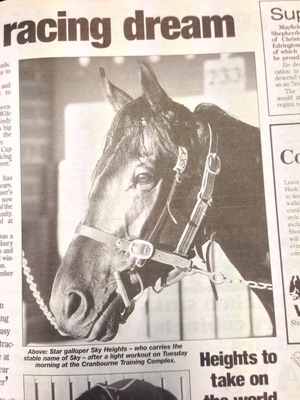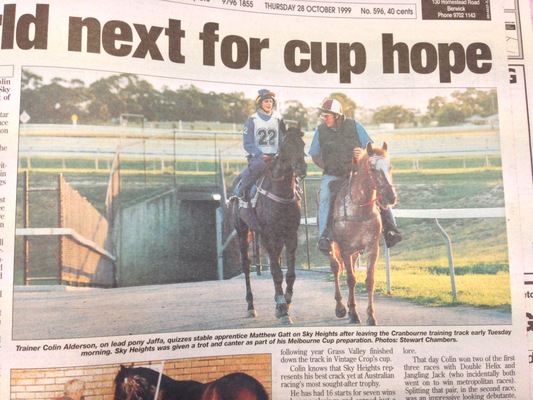A Medal of the Order of Australia in the Queen’s Birthday Honours List has capped off a stellar career in horse racing for Colin Alderson. The Bayles resident spoke to CASEY NEILL about his path to success, his struggles, triumphs and tragedy.
“IT’S a passion. It’s a disease, in one way, to be a horse person.”
“It’s like alcohol – you’re not an alcoholic until you have a drink.
“Once you’ve had it you won’t walk away from it.”
Colin Alderson’s dad introduced him to horses at an early age.
“He had a trainer’s licence but basically raced in the picnics,” he said.
“I grew up in that environment and then I, as I got older, I took up riding and rode as a picnic jokey for a while.
“You can see by my size it didn’t last long!”
He met his wife, Lyn, through breaking in a horse for her family when they were 16.
“My father-in-law was the first instigator of me taking out a trainer’s licence,” he said.
“We got married, bought a house.
“He made the suggestion that perhaps I should get a horse to train and he’d finance me.
“My father had trained a horse for him prior to that.
“Giving me a horse to break in, they must have had some faith in me.”
Colin progressed to breaking in a few horses for different trainers in the area.
“The first horse I ever raced, I can remember, ran a placing at Canberra,” he said.
“We got enough money to buy a pair of desert boots for me.
“We basically had nothing.
“I worked three jobs at that stage. I did a milk run of the night with a horse and cart.”
“I did a milk run of the night with a horse and cart.
“I’d come home and Lyn would go off to work and I’d toddle the kids off to school, and looked after them before they were of school age.
“I broke in horses during the day.”
They lived in Seaford at that time.
“Then we brought a property in Langwarrin. Then we came to here (Bayles) about 12 years ago,” he said.
“One of our first real training ventures, I was lucky enough to get a mare called Byam Rose.
“She broke six track records and won 15-odd races.
“She bought our first small farm.
“We were fortunate enough to get a horse called Nicholas John. He went on to win a metropolitan in Sydney.
“He actually bought the property I had in Craig Road in Cranbourne.
“The current house was financed by Sky Heights.”
The horse arrived at his Cranbourne stable via his New Zealand friend and training colleague Alan Jones.
He claimed the 1999 Caulfield Cup with jockey Damien Oliver on board.
“There’s a lot of pressure goes on to train a horse to win a race such as a Caulfield Cup,” Colin said.
“After the race the letdown surprised me. You felt so flat.
“It was a ’glad it’s over’ sort of thing.
“It does give you a real sense of achievement.”
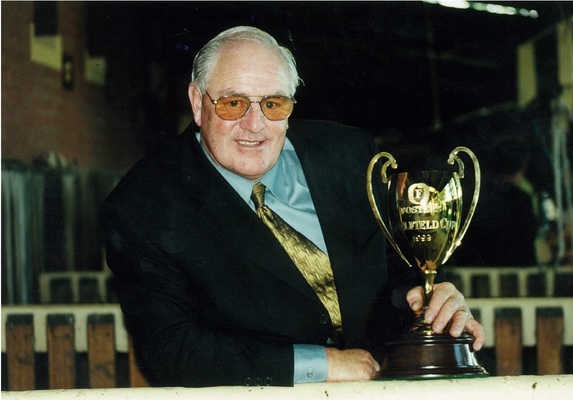
Sky Heights then placed third in the Cox Plate at Moonee Valley, and started favourite for the 1999 Melbourne Cup but finished a disappointing 17th.
Over the next two seasons he won the Yalumba Stakes, AJC St Leger and the 2001 Sandown Classic.
Ethereal nosed him out of the 2001 Caulfield Cup. Sky Heights retired from racing in April 2004.
It’s not only horses that Colin’s poured his time into.
“The training complex at Cranbourne was initiated by myself and Tommy Harrison,” he said.
“It trains up to 800 horses currently.
“It’s the best training facility, I think in Australia, definitely in Victoria.”
The project started with an offer of property to put a training complex on.
“It worked out that we couldn’t get finance from the racing body unless we had a committee of management, as in the Cranbourne Turf Club,” he said.
“We got them to come on board with us and we got the Racing Minister Neil Trezise to push it along a bit for us.
“Hence they built a complex next to the Cranbourne Race Track, that’s a separate identify from the racing track.”
Colin has just joined the committee of management and attended his first meeting the day the Gazette caught up with him.
“I think there’s 150-odd trainers training at Cranbourne now,” he said.
“It is the biggest training facility in Victoria now.
“That’s probably one of my biggest achievements.”
That project and his 30-odd years with the Australian Trainer’s Association (ATA) earned him a Medal of the Order of Australia in this year’s Queen’s Birthday Honours List, announced on Monday 13 June.
“It certainly was a surprise,” he said.
“It’s nice to receive an award. It’s humbling.
“You don’t go into things like trainers associations or racing expecting to get awards – you do it for the benefit of racing and trainers.”
He’s been the ATA president since 1997 and is a life-member, and was the Victorian branch president from 1992 to 2012.
“It represents horse trainers in Australia,” he said.
“Basically you go in to sort out disputes between owners.
“The federal body manages negotiation with governments and unions over wages.
“On the domestic side, you might have track management problems, not up to standard to race or train on, those sorts of things.
“That’s where the state branches manage.
“We’ve just got the racing industry to come on board to help with the collection of bad debts, where owners will be banned from racing if they don’t meet their bad debts.
“I think that’s probably the biggest thing we’ve done in my time in the training association, to give them some security.”
Colin said the provisions didn’t go quite as far as he wanted.
“At least the government have set up a body now we can go to and say ’Jo Blow owes us money’.
“If you can prove your cases you can stop him from racing or selling horses.
“In previous times he could owe me money and go next door to another bloke and the horses race on.
“I think trainers themselves are not represented or looked after in the industry as they should be.
“They go to the sales, they buy horses.
“Trainers find the client, put them in a horse and race the horse on their behalf.
“They get up at 3am to train the horses, take them to the races …
“Trainers basically cop the dirty end of the stick because they don’t stick up for each other.
“That’s probably the main reason why I got into representing trainers, to get them a better way of life in racing.
“Race clubs themselves provide their members better facilities than they provide for the trainers and the owners.
“Without owners and trainers, you wouldn’t have a product.”
Colin officially retired from training earlier this year and his daughter Cindy Alderson took over the Alderson Racing business.
“I’ve had a few health issues. It’s time to try and smell the roses.
“It’s a pretty full-time job. It’s a big enough job just running this property.
“We breed a lot of our own yearlings and foals here.
“We breed about 16 a year, plus what you go and buy at the sales.
“It’s Lyn’s passion, the breeding.”
There are about 70 horses on the Bayles property, named Freedom Fields, and another 35 in work at Cranbourne with Cindy.
She first got on a horse at age three and has since worked under Colin’s watchful eye, competed in equestrian events, and gained experience at stables in the UK, US and New Zealand.
She was among the first women in Australia granted a permit to train when she obtained her licence in 1990.
Cindy worked on a Racing Victoria traineeship program for a time, wrote resource materials for racing industry training for Victoria University, and in 2000 committed to training full-time.
She planned to take over Alderson Racing with her brother Steven, but tragedy struck in January.
“It was all in place,” Colin said.
“He was up in Brisbane at the Magic Millions sales.
“He didn’t wake up one morning. He just had a heart attack and died.
“He’s got a wife and two little kids. They’re the main issue now.
“It mucked Cindy around as much as it did us. We didn’t have a foreman in place to help her.
“She’s trying to manage a stable of 35 horses on her own.”
Colin’s not keen to make a return to training, but concedes “we’ll always run or race a horse”, reiterating “it’s a disease, you’ll never walk away from it”.
Cranbourne Racing Centre will host a lunch to celebrate Colin’s career on Friday 24 June.

